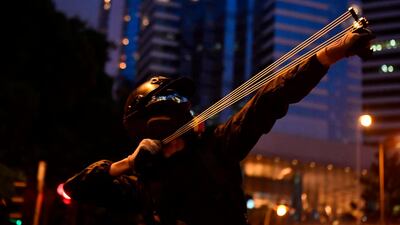Chaos engulfed the heart of Hong Kong on Saturday night as police fired tear gas and water cannon at protesters who set large fires and threw petrol bombs.
The protesters defied a police ban on demonstrations and warnings from China to take to the streets for a 13th straight weekend. Police also arrested several pro-democracy activists and legislators on Friday.
But on Saturday afternoon, tens of thousands of protesters defied the order and marched through Hong Kong island chanting "reclaim Hong Kong, revolution of our times".
As evening fell, violence broke out in the city's commercial centre, with a minority of hardcore protesters throwing petrol bombs and rocks at riot police.
Hong Kong police said "radical protesters" threw "corrosives and petrol bombs" at officers, "posing a serious threat to the safety of everyone".
Masked demonstrators started a large fire at a barricade on a major street close to Hong Kong police headquarters. The fire was extinguished as police pushed them back into the neon-lit shopping hub of Causeway Bay, under a hail of tear-gas rounds and sporadic firing of rubber bullets.
Police, some undercover dressed as protesters, made numerous arrests.
The months-long protests were sparked by an attempt by Hong Kong's government to pass a bill which would have allowed extradition of suspects to China. But they have expanded into a wider pro-democracy push and a rejection of attempts by Beijing to curtail the freedoms enjoyed by the semi-autonomous territory under a "one country, two systems" agreed when Britain returned it to China in 1997.
Earlier on Saturday, police fired a water cannon and tear gas to disperse protesters massed in front of the city's parliament, known as the Legislative Council, which was stormed in July during the early days of the protest movement.
Xinhua, Beijing's state media service, posted a video on Twitter late on Saturday of armed Chinese riot police holding "anti-riot drills in Shenzhen", a city which borders Hong Kong.
It was the latest salvo in a campaign aimed at protesters in the southern city.
Opposition to the extradition bill – now suspended but not permanently withdrawn – has brought much of Hong Kong to the streets, with millions marching peacefully but also groups of radical protesters clashing with police.
Protesters were in a defiant mood throughout Saturday, which marked the fifth anniversary of Beijing's rejection of a call for universal suffrage for Hong Kong that sparked the 79-day "Umbrella Movement" in 2014.
Many demonstrators are determined not to let the new movement fizzle out like the Umbrella protests did.
"It's 'now or never' for Hong Kong," said a 33-year-old accountant who gave her surname as Wong.
"I'm a mother-of-two. They didn't come today but their grandmother did. We're defending the right of assembly for the next generation in Hong Kong."
Two of the Umbrella Movement's leaders, Joshua Wong and Agnes Chow, were among at least five high-profile activists and three lawmakers who were arrested on Friday.
They were charged for "inciting others to take part in unauthorised assembly" before being bailed.
More than 900 people have been arrested since June in connection to protests.
The European Union's diplomatic chief Federica Mogherini said the developments were "extremely worrying", while US President Donald Trump said his economic pressure on China was forcing Beijing to take a more moderate line on Hong Kong.
The weeks of violence have damaged Hong Kong's reputation for stability and prosperity.
In an attempt to sidestep Saturday's protest ban, crowds earlier sang "Hallelujah" in religious gatherings – which do not require the same stringent permission from authorities.

